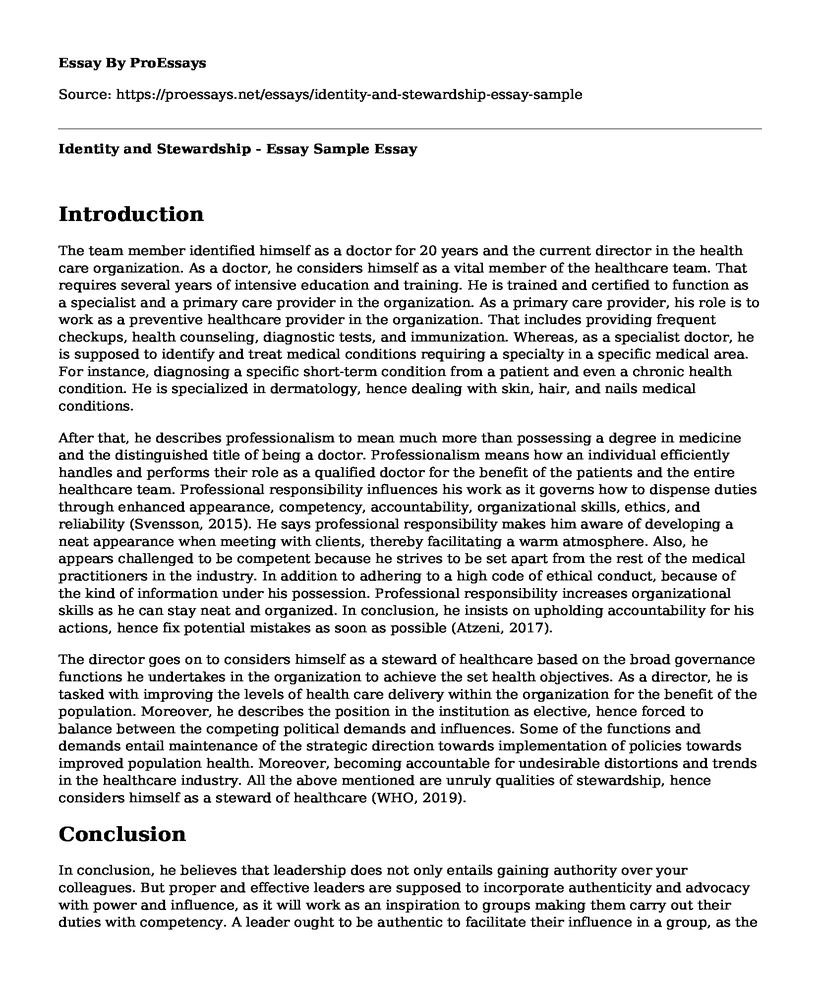Introduction
The team member identified himself as a doctor for 20 years and the current director in the health care organization. As a doctor, he considers himself as a vital member of the healthcare team. That requires several years of intensive education and training. He is trained and certified to function as a specialist and a primary care provider in the organization. As a primary care provider, his role is to work as a preventive healthcare provider in the organization. That includes providing frequent checkups, health counseling, diagnostic tests, and immunization. Whereas, as a specialist doctor, he is supposed to identify and treat medical conditions requiring a specialty in a specific medical area. For instance, diagnosing a specific short-term condition from a patient and even a chronic health condition. He is specialized in dermatology, hence dealing with skin, hair, and nails medical conditions.
After that, he describes professionalism to mean much more than possessing a degree in medicine and the distinguished title of being a doctor. Professionalism means how an individual efficiently handles and performs their role as a qualified doctor for the benefit of the patients and the entire healthcare team. Professional responsibility influences his work as it governs how to dispense duties through enhanced appearance, competency, accountability, organizational skills, ethics, and reliability (Svensson, 2015). He says professional responsibility makes him aware of developing a neat appearance when meeting with clients, thereby facilitating a warm atmosphere. Also, he appears challenged to be competent because he strives to be set apart from the rest of the medical practitioners in the industry. In addition to adhering to a high code of ethical conduct, because of the kind of information under his possession. Professional responsibility increases organizational skills as he can stay neat and organized. In conclusion, he insists on upholding accountability for his actions, hence fix potential mistakes as soon as possible (Atzeni, 2017).
The director goes on to considers himself as a steward of healthcare based on the broad governance functions he undertakes in the organization to achieve the set health objectives. As a director, he is tasked with improving the levels of health care delivery within the organization for the benefit of the population. Moreover, he describes the position in the institution as elective, hence forced to balance between the competing political demands and influences. Some of the functions and demands entail maintenance of the strategic direction towards implementation of policies towards improved population health. Moreover, becoming accountable for undesirable distortions and trends in the healthcare industry. All the above mentioned are unruly qualities of stewardship, hence considers himself as a steward of healthcare (WHO, 2019).
Conclusion
In conclusion, he believes that leadership does not only entails gaining authority over your colleagues. But proper and effective leaders are supposed to incorporate authenticity and advocacy with power and influence, as it will work as an inspiration to groups making them carry out their duties with competency. A leader ought to be authentic to facilitate their influence in a group, as the members will respond positively; hence the group can accomplish a common goal. Therefore, leadership without incorporation of power leads to confusion, whereas, insufficient authenticity and advocacy make the group members feel their opinions does not matter.
References
Atzeni, G. (2017). Professional Expectation Management: The Doctor as a Social Figure. Professions And Professionalism, 7(1), 1624. doi: 10.7577/pp.1624
Svensson, L. (2015). Occupations and Professionalism in Art and Culture. Professions And Professionalism, 5(2). doi: 10.7577/pp.1328
WHO. (2019). WHO | Stewardship. Retrieved from https://www.who.int/healthsystems/stewardship/en/
Cite this page
Identity and Stewardship - Essay Sample. (2022, Dec 12). Retrieved from https://proessays.net/essays/identity-and-stewardship-essay-sample
If you are the original author of this essay and no longer wish to have it published on the ProEssays website, please click below to request its removal:
- Essay Sample on Mentioning Disability in a News Report
- Assignment Example on Organization's Culture and Ethical Viewpoints
- Article Analysis Essay on What is an RN?
- Essay Example on Organ Trafficking in Egypt: They Locked Me In and Took My Kidney
- Essay Example on Organizational Design: Enhancing Business Structure and Efficiency
- Evidence-Based Practice vs. Research: A Comparison Essay
- Essay Example on Walmart Inc.'s Marketing & Financial Woes: Strategies for Improvement







